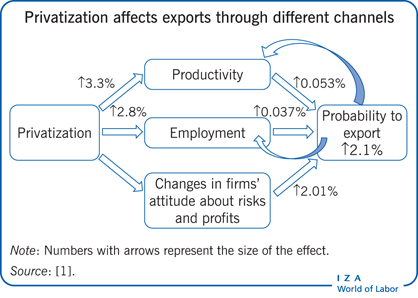Elevator pitch
The privatization of state-owned enterprises (SOE) in transition economies has often been found to improve employment and productivity of privatized SOEs, despite policymakers’ fears regarding possible job cuts. This positive effect can be enhanced if privatization also promotes firms’ exports. A recent firm-level analysis of China reveals that privatization has indeed a positive effect on export propensity, employment, and productivity in both the short and long term. The effect mostly stems from changes in firms’ attitudes about profits and risks due to competitive pressure.
Key findings
Pros
The privatization of SOEs in transition economies increases employment and productivity.
The probability that firms export increases due to privatization, primarily because their attitudes about risks and profits change.
Privatization may lead to a virtuous cycle among productivity, exports, and employment.
Restrictions on marginal ownership and institutional reforms help maximize the benefits of privatization.
Cons
The estimated effect of privatization on export propensity is based primarily on small- and medium-sized SOEs.
There is hardly any empirical evidence on the effects of privatization for large SOEs.
Because the estimated effect of privatization is drawn mostly from China and the former Soviet Union, it is not clear whether the results can be applied to privatization in less developed countries.
